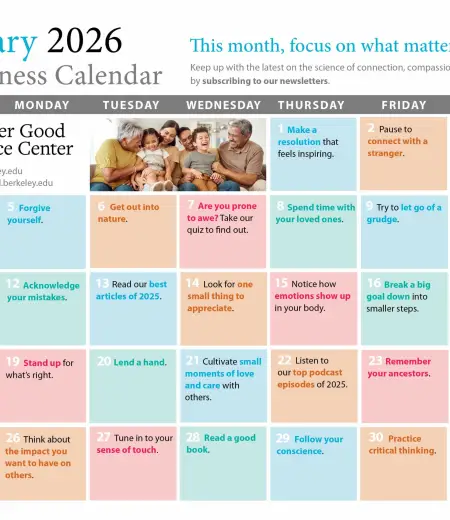At this time of the year when the calendar changes and the holidays are passed, we often reflect on “resolutions” for the year ahead. I don’t actually know of any empirical research that has examined whether New Year’s resolutions actually turn into reality. Of course, this begs the question of what it means to formulate a resolution in the first place, and then actually adopt it.
It seems that most of the time, such resolutions concern themselves with aspects of our behavior we do not like, and things we wish to change. As the Vietnamese Buddhist monk Thich Nhat Hanh once said, “When we have a toothache we know that not having a toothache is a wonderful thing but we do not pay much attention during these times and so, we do not appreciate them as much as we might.” What Thich Nhat Hanh was alluding to is that we actually have more positive emotion within us than we realize. The key, perhaps, is attending to it more and noticing when it is present.

So this year, I invite you to consider an alternative to the traditional New Year’s resolution. Instead of focusing on a behavior we wish to change or habit we may not like, reflect on the possibility of strengthening or nurturing those parts of yourself that reflect your basic goodness.
Indeed there is an increasing body of empirical science which firmly indicates that basic goodness is part of our human repertoire. Paul Bloom and his colleagues at Yale demonstrated that infants as young as six months prefer an individual who helps another to one who hinders another. Michael Tomasello of the Max Planck Institute in Germany has found that both human and chimpanzee toddlers engage in spontaneous acts of altruism to help others. These studies clearly establish the fact of innate basic goodness. From the youngest of ages, we are oriented to prefer altruistic others and to engage in altruistic acts. Of course, we all engage in these behaviors, but sometimes they become obscured amidst all of the other input we encounter on a nearly constant basis.
Due out this March, my new book, The Emotional Life of Your Brain: How Its Unique Patterns Affect the Way You Think, Feel, and Live–and How You Can Change Them, introduces six emotional styles that together, reflect our personality. One of the styles I identify is Outlook, which concerns how long you are able to sustain positive emotion.
One of the simplest ways to sustain positive emotion is to become more aware of it when it is there. The nervous system is particularly sensitive to change and it is more difficult to detect steady states. A toothache represents a departure from the usual and thus it commands our attention. If we are in a positive mood most of the time, we are less likely to notice this, or if we engage in positive acts on a regular basis, they may escape our attention.
So perhaps at this time of year, rather than focusing on a resolution that highlights our imperfections, we might promote a more positive Outlook and remember our own basic goodness. And while formal meditation practice is one way, there are countless, less formal other ways. Try posting little reminders in your workspace that provide you with cues to remember your basic goodness, post pictures of loved ones that provide such reminders, listen to specific music that you love or inspirational talks that do the same. All of these practices serve the same basic function – priming our awareness to pause and reflect on aspects of our basic goodness.
I want to thank all of you for your interest in this work. Together, as the Dalai Lama has reminded us, we can genuinely transform our minds to cultivate happiness by deliberately selecting and focusing on positive mental states. This is possible because the wiring in our brains “is not static, not irrevocably fixed — our brains are adaptable.”
Warmest wishes to each of you for a joyous and fulfilling New Year.
This piece originally appeared on the blog of Richard J. Davidson, Founder and Chair of the Center for Investigating Healthy Minds at the Waisman Center, University of Wisconsin-Madison. He is the author of The Emotional Life of Your Brain and The Mind’s Own Physician.






Comments
Oh wow, we have a calendar with sayings from Thich Nhat Hanh! (How cheesy is that?)
New Years Resolutions have become synomymous with failed goals. It’s a joke among anyone who has tried them. I think it’s a great idea to surround ourselves with reminders and to generally aim for a better self. I will try that this year.
2 years ago I tried an experiment, I set 2 types of resolutions: personal and eco. My eco resolutions were one per month, like starting a compost pile or buying only shade-grown coffee. I failed my personal goals right away, but 2 years running and I have made 24 changes that benefit the planet - and I wonder why those succeeded so well. Maybe because I gave myself a set amount of time for the goal.
Amelie | 12:30 pm, January 4, 2012 | Link
Last year I thought about 16 positive qualities (like Kindness, Generosity, Respect, Forgiveness…) one at a time and in terms of three points of view: 1) wouldn’t it be great if everyone got to experience this quality from those around them today, 2) wouldn’t it be great if everyone got the benefit of Practicing this quality today, and 3) what could I do to notice or grow in this quality today. This year I’m actually making these three wishes each day (just one minute while I heat my tea) with a tool called Three Wishes for a Meaningful Life. Here’s wishing everyone happier days and a more meaningful year.
Denise Flora | 5:20 pm, January 4, 2012 | Link